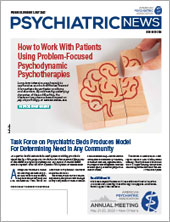APA Implores Congress to Enact Firearm Safety Legislation
In a statement, APA urged Congress to pass gun safety legislation that would reduce morbidity and mortality due to firearm-related violence and condemned the loss of lives to firearm violence, particularly in recent mass shootings in Uvalde, Buffalo, and Houston.
The statement highlighted APA’s support for several potential policies to address firearm violence, including background checks, waiting periods, safe firearm storage, research on firearm violence, and allowing physicians to make clinically appropriate inquiries regarding firearm access.
APA emphasized that the overwhelming majority of people with mental illness are not violent and are more likely to be the victims, rather than perpetrators, of crimes. “A vast majority of firearm violence is not attributed to mental illness,” the statement continues. “Rhetoric that argues otherwise will further stigmatize and interfere with people accessing needed treatment without addressing the root causes of firearm violence.”
Further, APA joined a coalition of 59 health-related organizations in issuing a statement addressing the false and harmful attempts to link mental illness and gun violence. Attempts to connect mental illness to mass shootings are a distraction that inflicts enormous damage, APA and its partners said. “This perpetuates a false narrative that encourages stigmatization of and discrimination against the millions of Americans living with mental health conditions.”
Bill Would Reauthorize Minority Fellowship Program, Increase Funding
An APA-supported bill introduced by Rep. Bonnie Watson Coleman (D-N.J.) would reauthorize the Substance Abuse and Mental Health Services Administration’s (SAMHSA) Minority Fellowship Program for another five years. Additionally, the Minority Fellowship Program Reauthorization Act of 2022 (HR 7857) would increase authorization of the funding level for the program from $12.6 million to $25 million.
“As a longtime advocate for health equity, I know that people of color, especially Black and brown people, disproportionately suffer from depression, substance use disorder, and other mental illnesses. This health disparity is compounded by a lack of access to affordable, high-quality mental health care services in underserved communities,” said Watson Coleman in a news release. “The SAMHSA Minority Fellowship Program changes lives by treating substance use as the mental health issue it truly is and providing culturally competent care to those who need it most.”
In the release, APA CEO and Medical Director Saul Levin, M.D., M.P.A., noted that APA is a long-time supporter of the program and hosts multiple fellows every year. “These fellowships are vital in training a diverse, culturally competent psychiatry workforce, while also striving to close the health equity gap for minority and underserved populations,” he said.
HHS Announces Funding for Mental Wellness Center, State Opioid Grants
The Department of Health and Human Services (HHS) announced a $2 million funding opportunity to establish the Center of Excellence on Social Media and Mental Wellness through SAMHSA. The center will develop and disseminate information, guidance, and training on social media’s impact on children and youth, especially the risks it poses to children’s mental health. It will also examine potential interventions to mitigate that risk.
“In the past decade, the number of children and youth diagnosed with mental health conditions, such as anxiety and depression, has significantly increased, concurrent with significant increases in the amount of time children and youth are spending on social media,” HHS Secretary Xavier Becerra said in a news release. “While there are benefits to social media use, there are clearly risks, too—especially when it comes to mental health. This new center will help us better protect children and youth from these harms.”
HHS also announced a grant funding opportunity through SAMHSA of $1.5 billion for states and territories to support their response to the opioid epidemic. The grant program provides greater access to medications to treat opioid use disorder (OUD) and supports efforts around prevention, harm reduction, treatment, and recovery support services for OUD and other substance use disorders. ■
